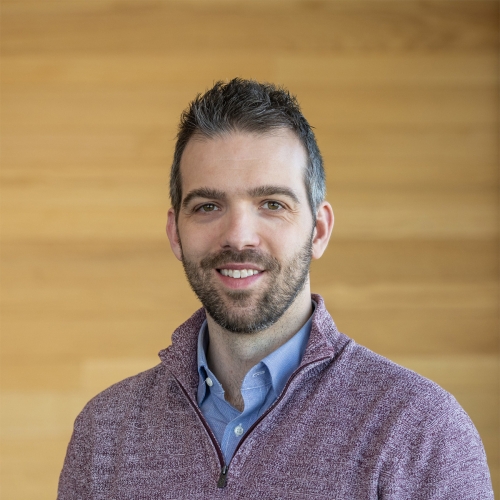
Available to mentor

Tristan Maerz, Ph.D. is an Assistant Professor of Orthopaedic Surgery and Biomedical Engineering. He completed his undergraduate studies in Biomedical Engineering at Lawrence Technological University, followed by his Master’s and doctoral training in Biomedical Engineering at Wayne State University. Prior to joining the Orthopaedic Surgery faculty at the University of Michigan, Dr. Maerz was a research engineer and the director of sports medicine research at Beaumont Hospital in Royal Oak, MI and held an Assistant Professor of Orthopaedic Surgery appointment at the Oakland University – William Beaumont School of Medicine. Dr. Maerz and his laboratory are part of the Orthopaedic Research Laboratories, an interdisciplinary faculty consortium within the Department of Orthopaedic Surgery, and he is interested in basic science, translational, and clinical research focused on sports medicine-related injuries and pathologies. Dr. Maerz is an active member of the Orthopaedic Research Society (ORS) and Osteoarthritis Research Society International (OARSI), which are his primary academic communities.
Dr. Maerz’ primary research area is the pathogenesis of post-traumatic osteoarthritis (PTOA) following joint injury, with a specific focus on the synovium and injury-induced molecular mechanisms that modulate the onset of joint degeneration. The Maerz laboratory has a strong translational focus, and each major research platform aims to discover druggable targets to develop novel, disease-modifying treatments for PTOA.
Given the expanding incidence of joint injury and the rapidly-growing burden of osteoarthritis and its associated musculoskeletal and non-musculoskeletal comorbidities, a critical need exists to alter the natural history of tissue degeneration following joint injury. To study the complex phenotype of PTOA, the Maerz lab employs multi-faceted assessments to discern in vivo molecular processes, gene and protein expression and content, pain sensitization, pathologic tissue remodeling, and cellular composition. A strong focus is placed on quantitative assessments of PTOA disease severity to minimize or eliminate subjective interpretation, and quantitative imaging is used heavily to strengthen the joint phenotyping approaches. The Maerz lab also employs multiple genetically-modified mouse models to dissect the molecular mechanisms of osteoarthritis.
The mission of the Maerz lab is to foster an inclusive and diverse environment in which innovative, multidisciplinary science can be conducted. Collegiality and collaboration are top priorities, recognizing that rigorous team science will be necessary to develop a successful treatment for PTOA.
-
Lee JYJ, Wu JC, Chatterji R, Koueiter D, Maerz T, Dutcheshen N, Wiater BP, Anderson K, Wiater JM. JSES Int, 2024 Mar; 8 (2): 282 - 286.Journal ArticleComplication rates and efficacy of single-injection vs. continuous interscalene nerve block: a prospective evaluation following arthroscopic primary rotator cuff repair without a concomitant open procedure.
DOI:10.1016/j.jseint.2023.10.008 PMID: 38464451 -
Jung J-Y, Habib M, Morrissette LJ, Timmons SC, Maerz T, Fields AJ. JOR Spine, 2024 Mar; 7 (1): e1297Journal ArticleNon-enzymatic glycation reduces glucose transport in the human cartilage endplate independently of matrix porosity or proteoglycan content.
DOI:10.1002/jsp2.1297 PMID: 38222801 -
Ramos Y, Rice SJ, Ali SA, Pastrello C, Jurisica I, Rai MF, Collins KH, Lang A, Maerz T, Geurts J, Ruiz-Romero C, June RK, Thomas Appleton C, Rockel JS, Kapoor M. Osteoarthritis Cartilage, 2024 Feb 28;Journal ArticleEvolution and advancements in genomics and epigenomics in OA research: How far we have come.
DOI:10.1016/j.joca.2024.02.656 PMID: 38428513 -
Colazo JM, Hoogenboezem EN, Keech MC, Francini N, Shah V, Yu F, Lo JH, Sorets AG, McCune JT, Cho H, DeJulius CR, Michell DL, Maerz T, Vickers KC, Gibson-Corley KN, Hasty KA, Crofford L, Cook RS, Duvall CL. bioRxiv, 2023 Dec 28;Journal ArticleAlbumin-binding RNAi Conjugate for Carrier Free Treatment of Arthritis.
DOI:10.1101/2023.05.31.542971 PMID: 37333210 -
Philpott HT, Blackler G, Daniel Klapak J, Pitchers KK, Tomlinson M, Smith N, Viehweger J, Umoh JU, Holdsworth DW, Maerz T, Thomas Appleton C. J Orthop Res, 2023 Dec; 41 (12): 2617 - 2628.Journal ArticleEffects of risk factors on evoked pain patterns in rat models of experimental knee osteoarthritis.
DOI:10.1002/jor.25593 PMID: 37132371 -
Maerz T. Osteoarthritis Cartilage, 2023 Dec; 31 (12): 1531 - 1533.Journal ArticleIs synovitis inevitable after ACL injury?
DOI:10.1016/j.joca.2023.08.001 PMID: 37597654 -
Knights AJ, Farrell EC, Ellis OM, Song MJ, Appleton CT, Maerz T. bioRxiv, 2023 Oct 5;Journal ArticleSynovial macrophage diversity and activation of M-CSF signaling in post-traumatic osteoarthritis.
DOI:10.1101/2023.10.03.559514 PMID: 37873464 -
Maerz T. 2023 Sep 5;PresentationThrombospondin-1 and -2 mediate joint homeostasis and injury responses